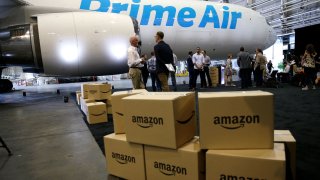
- Amazon's aircraft fleet is on pace to have doubled in size between May 2020 and June of this year, according to a recent study.
- Its one of several moves that signal a broader expansion of Amazon's air cargo operations, researchers say.
- The company recently posted job listings for maintenance managers and staff to oversee contractors, indicating Amazon Air is "one step closer to being set up to run like an airline."
Amazon's aircraft fleet is on pace to have doubled in size between May 2020 and June of this year, laying further groundwork for Amazon Air to rival the likes of carriers FedEx and UPS, according to a study.
Amazon Air now makes an average of 140 flights per day and is expanding its fleet, signaling a "growth spurt this spring," said the report issued Tuesday by DePaul University's Chaddick Institute for Metropolitan Development.
"As new airplanes are added to the fleet, we anticipate the number of flights will grow to 160+ by June 2021," according to the report. "If it reaches this milestone, Amazon Air will have approximately doubled in size in the 13 months between May 2020 and June 2021."
Amazon's air cargo fleet is a critical part of the company's strategy to meet its increasingly ambitious one- and two-day delivery targets. The company quietly began testing out air cargo operations in Wilmington, Ohio, in 2015 as part of a project under the code name "Aerosmith." Since then, Amazon Air has grown rapidly, particularly during the coronavirus pandemic.
Amazon leases most of its cargo aircraft through Atlas Air Worldwide Holdings and Air Transport Services Group, but in January it purchased 11 used Boeing 767-300 jets from Delta and WestJet.
Money Report
When the 11 Boeing jets are in service by the end of 2022, Amazon will have a fleet of more than 85 planes. That's a far cry from FedEx, which has 679 planes, and UPS' fleet of 572 owned, leased or chartered aircraft.
Still, analysts believe Amazon's growth trajectory could set it on a collision course with major shippers. Morgan Stanley has predicted Amazon could potentially leverage its end-to-end logistics operations to offer delivery services to outside parties as soon as this year.
The DePaul researchers agree with the Morgan Stanley prediction, but believe it will take longer because Amazon will wait for its $1.5 billion air hub in northern Kentucky to open this year, possibly use the 2021 holiday season as a test, then explore the idea of opening up its logistics services to third parties.
"Amazon's entry into this business will likely occur in the next 18 months, and when it occurs, Amazon Air — and the CVG/Wilmington hubs in particular — will be critical," says the study.
Flights from the Kentucky and Ohio airports where Amazon's hubs are located "already connect Amazon to most of the US population," they added.
The company offers a next-day delivery service in the U.K. to third-party retailers who don't sell on its platform, called Amazon Shipping, proving it already has its "toe in the water," of offering up its in-house delivery network to outside parties, said Joseph Schwieterman, director of the Chaddick Institute, in an interview.
Amazon previously operated a similar service in the U.S., but halted the nascent program in April as the pandemic placed major strains on its delivery network.
"I think they can start to be a niche operation, where it's a couple of retailers that integrate themselves into the Amazon delivery network," Schwieterman said. "And that can be done without a whole lot of risk."
'One step closer to an airline'
Aside from the sheer growth of Amazon's fleet size, the company has made other moves that could telegraph broader ambitions in the air cargo industry.
Amazon is bringing some air cargo operations in house, instead of relying on outside contractors. Over the last few months, the company has posted job listings for maintenance managers and managers to oversee contracted air ground operators.
"If you're just leasing planes, you don't set up an internal staff that has expertise in heavy maintenance and things like that," Schwieterman said.
Any shift away from contractors will move slowly, at least in the U.S., Schwieterman acknowledged.
The company's first European air hub at Leipzig/Halle airport in Germany, which opened last November, provides a good example of how Amazon's future U.S. air cargo operations might take shape. At the Leipzig/Halle hub, Amazon is now handling the ground services, such as loading and unloading packages, with their own staff, "which is one step closer to being set up to run like an airline," Schwieterman said.
Ultimately, moving more of its air cargo operations in house would allow Amazon to better control costs and delivery speeds.
"I think Amazon's enormously complicated supply chain is subject to risk when you are so solely dependent on a handful of contractors," Schwieterman said. "One of them goes broke, or one of them cuts the cord, and suddenly you have a crisis.
"So I do think getting expertise on what it takes to run an airline will allow them to make strategic decisions about how much to bring in house in a methodical way," he added.
Representatives from Amazon didn't immediately respond to a request for comment on the study and its expansion plans for Amazon Air.






